- Home
- Allan Topol
Dark Ambition Page 5
Dark Ambition Read online
Page 5
He couldn't afford to be out-of-pocket for the next four or five hours. Too much was going on. He had too much at stake. In fact, as he thought about it, he'd better be with the President this afternoon. No telling what Jim Slater would do on his own. "Listen," he said gingerly, knowing that his next words would produce a violent response. Ah, well, that came with marrying a general's daughter. "With Winthrop's death, it would be unseemly for me to be at a football game."
She snarled at him. "You fucking hypocrite. You couldn't stand the man."
"I know that, but—"
"Oh, for chrissake," she shouted. "Give me the tickets. I'll call Mary Jo and I'll go with her. I can't believe you'd pass up the Dallas game for a man you described as 'a pompous, self-important jerk, and the President's albatross.' "
"Shh, keep your voice down. It's not right to talk that way about the dearly departed." He laughed and she did too. "Did I really use all of those words?" he said.
"Yeah. And you also called him a despicable, whoring peckerhead."
* * *
Chip Donovan sipped scotch and ran his hand through his thick gray hair. From his suite in the sophisticated and luxurious Ritz Landis Hotel, he overlooked downtown Taipei. It was already thirty minutes past midnight. Chen Heng was half an hour late. Was it possible he wouldn't show?
It was ridiculous for Donovan to have made the trip from Washington. This wasn't a journey for the head of special operations at the CIA. It was a job for someone on his staff. Sherman, who operated throughout Asia under the cover of a representative of a high-tech venture capitalist, was the logical choice. Sherman had helped plan Operation Matchstick. Donovan should have insisted that Sherman cover this meeting.
As those thoughts ran through his mind, Donovan knew why he had to come. He had recruited Chen more than a decade ago at the time of the protests in support of the students in Tiananmen Square. Chen needed delicate handling, and he was the one to whom Chen responded. Now that they were close to launching Operation Matchstick, Chen would be having anxiety attacks, and for good reason. Only Donovan could keep Chen on board.
Donovan heard a sudden knock at the door. Tensing, he reached for his gun. "Who's there?" he called.
"It's Chen."
Donovan relaxed. Dressed in his usual black suit with a black turtleneck shirt, he crossed the room and opened the door. "You're late."
"I'm sorry. My father insisted that I come to his house this evening. He wanted to give me more instructions about the plant in Shanghai."
Alarmed, Donovan said, "He doesn't know you're working with me, does he?"
"No, of course not. He wants to know when I'm ready to go over."
"What'd you say?"
"I dodged the question. I was ready to go last week. Then I got your fax, telling me the purchase order was on hold until further notice."
"It was."
"And now?"
Donovan looked around the room. He had swept it for bugs. Still, he didn't want to say anything too explicit. "Operation Matchstick is back on. How soon can you leave for Shanghai?"
Worry lines appeared on Chen's forehead. "Not tomorrow. My older son, Teddy, has a championship baseball game. He's pitching." Chen sighed in resignation. "I guess I can go on Monday."
"Monday is good."
"Will you be able to reassemble the other pieces in time?"
"Everything will be set. Assume that Monday is day one and count from then on the original schedule."
"What about the Chinese army units?"
Donovan answered tersely, "I told you, everything will be set."
Chen responded by taking off his wire-framed glasses and cleaning them with a handkerchief. He didn't have to say a word. Donovan knew that he was trying to decide whether to tell Donovan to shove it and return to his normal life.
Afraid of losing him, Donovan softened. "It's important for your people, what you're doing." He had to keep reminding himself that Chen wasn't a professional. This was Chen's first operation. He was putting his life on the line.
After more work on him, emphasizing the value of the operation to the people of Taiwan, Chen yielded.
They sealed their agreement with a drink. Operation Matchstick was back on track.
After Chen left, Donovan waited a full hour to exit the hotel. He walked a half dozen blocks before ducking into a dimly lit bar. It took a few moments of peering and looking around the smoke-filled room where bar girls entertained their customers before he recognized the man he was looking for—Peng, a senior member of the Taiwanese intelligence service. Peng worked out of a trade mission in Paris, but had flown home at Donovan's request. The two men had collaborated on a number of operations aimed at China over the last decade.
Peng was sitting in an almost pitch-dark corner of the room, drinking beer from a glass and smoking a cigarette. After nodding to him, Donovan stopped at the bar, picked up a scotch straight up, and took the chair next to Peng.
"Thanks for coming here to meet me," Donovan said.
"I was due home for other matters. The timing was good."
Donovan smiled faintly. Peng was letting him know that he wasn't at Donovan's beck and call. "Operation Matchstick is on again," Donovan said.
A smile formed at the edges of Peng's mouth. "When?"
"Subject leaves Monday for Shanghai. I'm worried about leaks."
"No one knows you're here except for me and the director. You don't have to worry about us. I'll let the director know."
"I appreciate that."
"Your timing couldn't be better."
Donovan was nonplussed. "What do you mean?"
"The Chinese have begun significant troop movements toward the Strait of Taiwan in the last couple of days."
Surprise registered on Donovan's face. "To my knowledge, we haven't picked up anything on our satellites yet. How do you know that?"
By way of answer, Peng calmly blew smoke rings into the air.
Donovan pressed. "I've been open with you about Operation Matchstick."
"You're right," Peng said finally. "Our source is one of our moles in the Chinese intelligence service."
"Are these troop movements the usual saber rattling from Beijing?"
Peng paused to sip his beer. "We don't think so. It's more heavy equipment, including landing craft, trucks, and heavy weapons, as well as infantry. Precisely what's needed to launch an attack on Taiwan."
"Jesus, why do you think they're doing it now?"
Peng shrugged. "It could be Beijing's response to the Winthrop arms package for Taiwan."
"But Winthrop's dead."
"That fact is being celebrated in Beijing. Meantime, Brewster hasn't said he'll modify the Taiwan arms package. My guess is," Peng said sourly, "they're thinking about a preemptive strike."
Chapter 5
"Damage control," Jim Slater, the President's chief of staff, said aloud as he paced in his White House office early that afternoon. Winthrop's murder could easily derail Brewster's reelection next year, and Slater was determined to stop that from happening.
Aside from the three hours he had tossed in bed last night, hoping to sleep, he had spent every minute since he and Brewster had returned from Camp David, once they heard the news of Winthrop's death, engaged in damage control. He had met with newspaper reporters and given television interviews. He had assigned Ed Fulton on his staff to the investigation, and Fulton had kept him informed of every development. In the cold light of the morning, Slater knew very well that only one thing would solve the problem—a fast arrest and conviction. But that required a suspect.
For the first time he was beginning to breathe a sigh of relief. The law enforcement net had snared the gardener. It might be possible to close out the case in record time.
Slater heard a phone ringing on his desk. He expected it to be the President's secretary telling him that Brewster had returned to the White House after a condolence call on Ann Winthrop. Instead, it was his private phone, which he snatched on the first ring
.
Slater heard a melodious woman's voice. "Jim, I've been out. I just listened to the message on the special cell phone you left me."
"I'm real sorry I can't make it tonight."
"I could meet you earlier or later. Whatever works for you."
Slater hesitated. God, with all of the tension, what he most needed was an hour in bed with her tonight. Slater glanced at the grandfather clock standing against the wall across the room, next to a picture of Slater on a horse with the Oxford University polo team taken thirty-five years ago.
As hard as he tried, Slater couldn't rationalize leaving this building until well after midnight again. Nothing was more important right now than steering a path through this morass so that Brewster was still standing politically when it was all over—which meant that Slater would be alive as well. "Just can't do it tonight. I'm so sorry."
"Is your wife in town?" she said.
He knew her well enough to tell she was pouting. Trying to cheer her up, he laughed. "If Alice were here, she wouldn't stop me for a minute. I'm afraid that I'm chained to my desk on account of Winthrop's death."
"Oh. I guess I can understand that. I saw you on Headlines last night. You sounded good, although your shirt was wrinkled."
Slater laughed again. "I've got no one to iron for me."
This time she laughed with him. "That won't be me. I don't iron."
"I didn't think so. You know that I'll see you as soon as I can."
"I know that, Jim."
"Meantime, we'll talk."
When he hung up the phone, Slater resumed pacing. He was a tall, handsome man, with a well-conditioned, athletic look that made him seem younger than his fifty-five years. Dressed in a dapper double-breasted gray pinstripe suit from Gieves & Hawkes on Savile Row—where he shopped twice a year—navy suspenders, and a monogrammed bold striped shirt that had become his trademark, topped off with gold presidential-seal cuff links, he was an imposing figure. With his thick head of dark brown hair parted in the center and pasted down, he looked very much like the New York investment banker he had been as chairman of Bullman and Glass, one of the largest investment banking firms in the world, before Brewster selected him to be secretary of the treasury two years ago. He exuded confidence and success. His appearance had contributed to the adjective "unflappable" that was frequently used to describe Slater in the Washington press.
Last year, when a rash of scandals brought the Brewster administration to its low point of a thirty percent approval rating, the President had moved Slater from the treasury to White House chief of staff. Slowly but surely, under Slater's cool stewardship, the President's standing had risen in the polls. Congressional Democrats had applauded Slater's efforts, thrilled that someone with a sharp analytical mind and not merely a political hack occupied that critical position in the White House. Increasingly, Slater was being mentioned as the next chairman of the Federal Reserve Board, which he viewed as the most important office in Washington next to being president. Now all of that was at risk.
In New York, Slater had prided himself on being able to find a way to do any deal and solve any problem. He had brought that ability with him when he came to Washington. He would find a way to deal with this situation. He would steer Brewster through this minefield, just as he had steered the CEOs of so many Fortune 500 companies through their minefields.
The phone rang again. This time it was Ed Fulton on Slater's office phone. "Is this a good time for a progress report, Mr. Slater?" Fulton asked.
"Fire away," Slater said in the curt voice he used with subordinates.
"The prosecutor you wanted, Ben Hartwell, will be here soon to help us get the search warrant."
"Do you and Traynor still think that the gardener killed Winthrop?"
"We're sure of it."
"What was his motive?"
"Robbery. Gillis needed cash. Winthrop had plenty of it in the house."
Slater tapped his manicured fingers on the desk. "Before you arrest this gardener, you'd better have an ironclad case. Am I making myself clear?" Slater imagined Fulton trembling at the other end of the phone.
"Yes, sir. You are."
"Because you know what would hurt President Brewster next November even worse than Winthrop's death don't you?"
"Yes, sir. Arresting the wrong man."
"No, arresting an African American who was the wrong man."
"I got that, sir."
"But if you and Traynor tell me after you do the search that he's the one, I won't second-guess you. I'll make sure that we nail his ass. Are you getting me?"
"Yes, sir, Mr. Slater. Loud and clear."
* * *
Before going to the FBI to meet Fulton and Traynor, Ben stopped at his own office in the U.S. Courthouse, a few blocks away. From the bookshelf he pulled down a large dark green volume—this year's issue of Lawyers in U.S. Government Service. Edward Fulton's entry was brief. It told Ben that Fulton was only thirty-two years old.
He had been born in Kalamazoo, Michigan, and he had been a super achiever in school, graduating summa cum laude and Phi Beta Kappa from Michigan, with a major in political science. Following graduation, he had enlisted in the marines, a fact that surprised Ben, and he rose to the rank of captain. Three years later, he entered Harvard Law School, where Fulton was editor-in-chief of the Harvard Law Review, graduating first in his class—a lot better than I did at Yale, thought Ben. But I managed to have a good time, unlike those geeks who studied night and day. He doubted whether Fulton had played as many poker games during his three years in law school. After graduation, Fulton had clerked for a U.S. court of appeals judge in Ohio and then for the chief justice of the Supreme Court. Two years ago, he had gone right from his clerkship to Jim Slater's staff as an assistant White House counsel. That didn't happen on merit alone. Somebody in the family or a friend must have had a connection with Slater or the president's party. Maybe a big contributor. Fulton was married and had two children.
From the bio, Ben could complete the picture. Fulton was not only bright, but incredibly ambitious and hardworking. Even driven. On the fastest possible track for success. Probably arrogant as well. His family would never stop him from getting ahead. They would either support him or be brushed aside. Ben had known plenty of Washington types like Ed Fulton. It was a lonely ride.
Ben decided to walk down Pennsylvania Avenue to the FBI building. He was only a couple of pounds overweight on his nearly six-foot frame, but he could feel himself getting flabby. In response, for his fortieth birthday in April, he had bought a treadmill. So far he had used it only twice. Between his job and Amy, there was never time for exercise.
Fifteen minutes later and out of breath, Ben arrived at the FBI. Quickly, he surveyed the scene in the fifth-floor conference room. Fulton and Traynor were sitting across a table that held a dozen half-empty cups of cold coffee and some doughnuts that were quickly going stale. Though both of them had glazed, bloodshot eyes, there was a difference in their appearances. Traynor's shirtsleeves were rolled up to the elbows, his collar was open at the neck, and his tie and jacket had been tossed on a chair in the corner. Fulton was still dressed smartly in a white shirt and a jacket and tie. He was tired, but he looked neat. That was the way Nan had always wanted him to look, Ben thought, but he rarely achieved that standard. Usually, he looked the way he did today: rumpled suit badly in need of a pressing and a food-stained tie.
Traynor introduced Ben to Fulton, then said, "Sorry for what I look like. We've been up all night."
"I figured as much. You guys have anything to show for it?"
"We've found the killer," Fulton announced with pride. "We just need you to get us a search warrant."
Fulton exuded the arrogance Ben had been expecting. "Why don't you tell me exactly what you've found?" he said to Traynor.
Fulton didn't like being ignored. "Get us the search warrant now before he gets rid of the evidence. We'll give you the details later."
"Wrong," Ben shot back. "
It doesn't work that way. Malcolm Penn's the judge on emergency duty today. He won't sign a simple extension of time, much less a search warrant, without the whole story."
Involuntarily, Fulton's eyes began blinking. He turned to Traynor. "I thought you said we'd be able to work with this guy. Right out of the chute, he's yanking our dicks around."
Traynor looked at Ben and gave a slight shrug. What do you want me to do? was what it conveyed to Ben, which wasn't very helpful. Oh, well, Ben was willing to do battle alone.
Once Traynor saw the fire flaring in Ben's eyes, he reassessed and decided to mediate, to head off a fight. "Listen, Ed, let's take a few minutes and tell Ben what we know."
"And after that, we're doing things my way," Fulton replied. "Otherwise, I'll get Mr. Slater to call Hennessey and straighten it out."
Ben was ready to pack up and head back to his office. Seeing this, Traynor held up his head. "Let's take a break," he said coolly, "and go to the men's room."
On the way, Traynor filled Ben in. "The kid's new. He's smart, but he's young and inexperienced. He's landed this big job on Slater's staff, and he wants to make a good impression. Get ahead fast. You know what I mean. Let him talk. We'll ignore him and do it our way."
That was a ludicrous proposal, coming from a guy who knows better, Ben thought. How bad could somebody want to retire? "That's a great way to approach a major case."
Traynor winced. "We don't have a choice. I don't like it any better than you. Please, we've got to work with him."
Ben didn't respond until they were alone in the bathroom washing their hands. "Is this hotshot naturally so obnoxious, or does he work at being that way?"
"Please, Ben, as a personal favor to me, try to work with him. This case is so high-profile that my ass is now on the line if something doesn't happen soon. You can't believe the heat we're getting from the White House."
Back in the conference room, Traynor went over to Fulton and persuaded him that they should give Ben a summary of what they'd found. Over a fresh cup of coffee, Traynor started talking. "Here's what we know so far. The secretary of state was home alone with two guards out in front of his house on Linean Court. At two o'clock, he had a visitor for a scheduled meeting. State Department business. A George Nesbitt, who showed a California driver's license for ID. We haven't been able to locate Nesbitt."

 Conspiracy
Conspiracy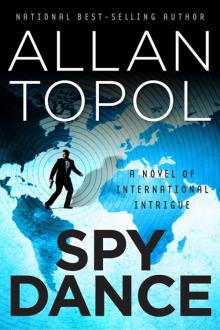 Spy Dance
Spy Dance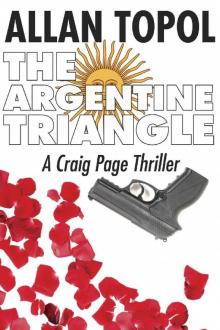 The Argentine Triangle: A Craig Page Thriller
The Argentine Triangle: A Craig Page Thriller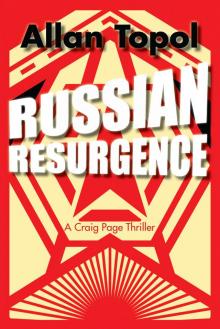 Russian Resurgence
Russian Resurgence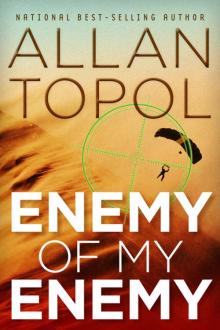 Enemy of My Enemy
Enemy of My Enemy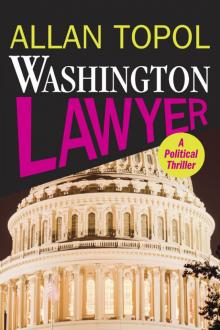 The Washington Lawyer
The Washington Lawyer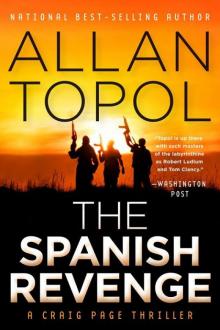 THE SPANISH REVENGE (Craig Page series)
THE SPANISH REVENGE (Craig Page series)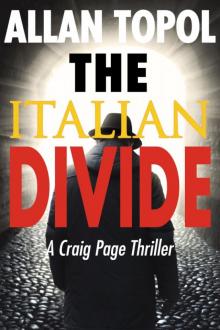 The Italian Divide
The Italian Divide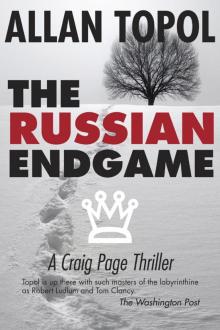 The Russian Endgame
The Russian Endgame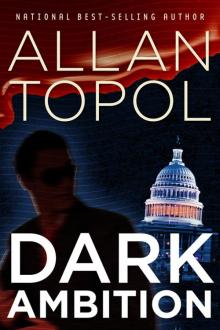 Dark Ambition
Dark Ambition